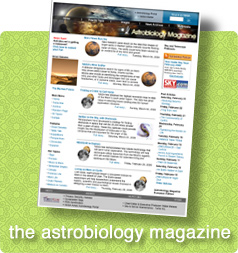-
ASTID Funds 15 New Projects
The Astrobiology Science and Technology Instrument Development (ASTID) Program this summer approved 15 proposals for funding, including mission concept studies and concept studies for small payloads and satellites.
The new projects were selected out of 97 proposals submitted in response to the NASA Science Mission Directorate’s 2007 Research Opportunities in Space and Earth Sciences (ROSES) solicitation. The new projects range from instruments for astrobiology investigations on future planetary exploration missions to a prototype artificial-gravity platform for small...
-
Liquid Water in the Martian North? Maybe.

Perchlorate. Never heard of it? Join the club. But NASA’s Phoenix spacecraft has found it in the soil in the icy northern plains of Mars. And now that it’s been found, scientists are scrambling to explain how it got there, and what, if anything, its presence means about the habitability of the martian north.
Phoenix didn’t go to Mars to find perchlorate. It went looking for evidence of liquid...
-
Astrobiology Rap
If you haven’t already, check out the new European Edition of the Astrobiology Magazine. Among all the interesting articles is a link to perhaps the first ever music video about Astrobiology!
August 20, 2008 / Posted by: Shige Abe -
The Nordic Invasion: Astrobiology Magazine, European Edition

Click here to read the latest Astrobiology Magazine, European Edition, a publication highlighting European scientists who study the history of life on Earth and the possibility for life beyond our world.
This Summer’s “Nordic Invasion” issue contains interviews with Hans Amundsen of the University of Oslo, Anthony Poole of Stockholm University, and Thomas Hode, a co-founder of the Swedish Astrobiology Network (SWAN). In a podcast interview with Axel Brandenburg of the NORDITA research...
-
Astrobiology Leadership Changes at NASA HQ
Dr. John Rummel, Senior Scientist for Astrobiology at NASA Headquarters, has announced that he is leaving NASA at the end of August to take a position with East Carolina University as Director of its Institute for Coastal Science and Policy.
The Institute for Coastal Science and Policy was established to initiate, promote, and coordinate interdisciplinary research on all aspects of riverine, estuarine, coastal, and shallow marine environments. Its goal is to enhance understanding of the complex interactions between human...
-
AMASE 2008 Blog
The 2008 Arctic Mars Analogue Svalbard Expedition now has a blog. Follow along as team members beam reports via Iridium satellite phone.
Here is a brief overview of AMASE from Andrew Steele in the blog
What is AMASE.
Since 2003 the Arctic Mars Analogue Svalbard Expedition has been traveling to field sites on Svalbard to test the protocols, procedures and equipment needed to detect traces of organic chemistry and perhaps life on Mars. The AMASE crew over...
-
World Summit on Ancient Microscopic Fossils

This past week at UCLA, Bill Schopf, of the IGPP Center for the Study of Evolution and the Origin of Life, convened this summit of 30 expert scientists worldwide in this area. Representing 12 nations, the scientists, many of whom had not met prior to this event, gathered to exchange ideas and learn about the latest cutting edge work, with emphasis on establishment of microfossil biogenicity and the applications of...
August 4, 2008 / Posted by: Daniella Scalice

Astrobiology Field Work
Rollover map to explore Astrobiology field sites around the world.

